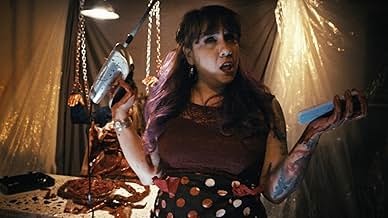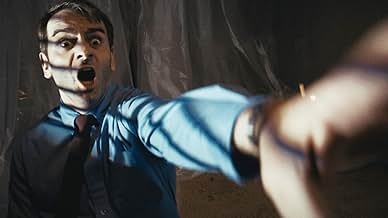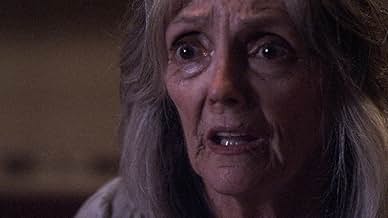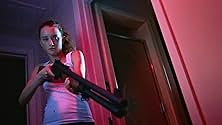Adulterous L.A. Deejay Mr.C spins five tales of malice and deceit that will leave you all to die...Laughing.Adulterous L.A. Deejay Mr.C spins five tales of malice and deceit that will leave you all to die...Laughing.Adulterous L.A. Deejay Mr.C spins five tales of malice and deceit that will leave you all to die...Laughing.
Featured reviews
Horrific fun, with an appropriate indie vibe. It's an anthology, just like the long-running digest fiction magazine it's based on. The unifying element is the host of a late night radio show, Mr. C, who queues up each new story. (Incidentally, Mr. C really is a radio host.) The film is loaded with easter eggs if you're into Pulp Modern and its brethren, like the now defunct Switchblade magazine. (Note Mr. C's letter opener.) Great fun, with clever plotting, solid direction, fine performances, and remarkably good production values. Okay, now let's see one of the streaming services sign these guys up for a series!
"Pulp Modern: Die Laughing" is a cinematic experience that successfully marries the macabre with the mirthful, providing an anthology that is as entertaining as it is unsettling. Directed by an ensemble of talented filmmakers including Aaron McJames, Scotch Rutherford, Cameron Schwartz, Ryan Shovey, and Alex Montilla, this film dives deep into the realms of horror and dark comedy, presenting five distinct tales of malice and deceit, each more gripping than the last.
The movie's narrative framework is ingeniously constructed around Mr. C, an adulterous L. A. Deejay portrayed with remarkable flair by Alexander Cicak. Mr. C, known for his legendary fornication and sharp wit, serves as the perfect host, spinning tales that traverse the darker corridors of human nature and supernatural occurrences. His charismatic and sardonic presence binds the anthology together, creating a cohesive thread through the disparate stories.
Each segment of "Pulp Modern: Die Laughing" explores a unique facet of horror, all while maintaining a darkly comedic undertone. The film opens with a millennial slasher story, a modern take on the classic genre, infused with contemporary anxieties and social commentary. The narrative is both terrifying and reflective, capturing the essence of youthful dread in a technology-driven society.
Next, the anthology delves into the supernatural with a tale centered on a demonic mirror. This segment is a masterclass in building tension and suspense, using the reflective surface as a portal to the unknown. The horror is palpable, yet it is interspersed with moments of dark humor that provide a welcome relief, showcasing the directors' adeptness at balancing fear with laughter.
One of the standout stories involves the dark half of a literary doomsayer, a character inspired by the rich tradition of pulp fiction. This narrative is particularly noteworthy for its complex characterization and psychological depth. It explores themes of identity, creation, and destruction, drawing the audience into a cerebral horror that lingers long after the credits roll.
The anthology takes a bizarre and unexpectedly hilarious turn with the inclusion of a satanic parrot. This segment is a testament to the film's willingness to embrace the absurd and the outrageous. The parrot, with its eerie mimicry and malevolent intelligence, becomes a symbol of unpredictable horror, all the while eliciting genuine laughs through its outrageous antics and the chaos it unleashes.
The final tale in the anthology deals with a vengeful wife scorned, a narrative that taps into primal fears and the darkest aspects of human relationships. This segment is a powerful commentary on betrayal and retribution, delivering a chilling yet satisfyingly cathartic conclusion to the film. The horror is grounded in real emotional stakes, making it one of the most relatable and impactful stories of the collection.
"Pulp Modern: Die Laughing" is not just a horror-comedy anthology; it is a homage to the enduring legacy of pulp fiction. Featuring adaptations of works by renowned authors such as Stephen King, Nicole Bird, and Alec Cizak, the film pays tribute to the genre's roots while pushing its boundaries. The screenplay, co-written by Alexander Cicak and the directing team, is sharp, witty, and unflinchingly dark, capturing the essence of the source material while injecting fresh perspectives.
The production quality is top-notch, with each director bringing their unique visual style and storytelling sensibilities to the table. The cinematography is evocative, the special effects are impressive, and the sound design is meticulously crafted to enhance the overall experience. The ensemble cast, including standout performances by Traycee King, Randy Havens, and Amy Letcher, delivers with commendable dedication and skill, breathing life into the eclectic array of characters.
In conclusion, "Pulp Modern: Die Laughing" is a must-watch for fans of horror and dark comedy. It is a film that challenges, entertains, and ultimately leaves you with a sense of uneasy satisfaction. Whether you're a longtime aficionado of pulp fiction or a newcomer to the genre, this anthology is bound to leave a lasting impression, making you laugh even as it sends shivers down your spine.
The movie's narrative framework is ingeniously constructed around Mr. C, an adulterous L. A. Deejay portrayed with remarkable flair by Alexander Cicak. Mr. C, known for his legendary fornication and sharp wit, serves as the perfect host, spinning tales that traverse the darker corridors of human nature and supernatural occurrences. His charismatic and sardonic presence binds the anthology together, creating a cohesive thread through the disparate stories.
Each segment of "Pulp Modern: Die Laughing" explores a unique facet of horror, all while maintaining a darkly comedic undertone. The film opens with a millennial slasher story, a modern take on the classic genre, infused with contemporary anxieties and social commentary. The narrative is both terrifying and reflective, capturing the essence of youthful dread in a technology-driven society.
Next, the anthology delves into the supernatural with a tale centered on a demonic mirror. This segment is a masterclass in building tension and suspense, using the reflective surface as a portal to the unknown. The horror is palpable, yet it is interspersed with moments of dark humor that provide a welcome relief, showcasing the directors' adeptness at balancing fear with laughter.
One of the standout stories involves the dark half of a literary doomsayer, a character inspired by the rich tradition of pulp fiction. This narrative is particularly noteworthy for its complex characterization and psychological depth. It explores themes of identity, creation, and destruction, drawing the audience into a cerebral horror that lingers long after the credits roll.
The anthology takes a bizarre and unexpectedly hilarious turn with the inclusion of a satanic parrot. This segment is a testament to the film's willingness to embrace the absurd and the outrageous. The parrot, with its eerie mimicry and malevolent intelligence, becomes a symbol of unpredictable horror, all the while eliciting genuine laughs through its outrageous antics and the chaos it unleashes.
The final tale in the anthology deals with a vengeful wife scorned, a narrative that taps into primal fears and the darkest aspects of human relationships. This segment is a powerful commentary on betrayal and retribution, delivering a chilling yet satisfyingly cathartic conclusion to the film. The horror is grounded in real emotional stakes, making it one of the most relatable and impactful stories of the collection.
"Pulp Modern: Die Laughing" is not just a horror-comedy anthology; it is a homage to the enduring legacy of pulp fiction. Featuring adaptations of works by renowned authors such as Stephen King, Nicole Bird, and Alec Cizak, the film pays tribute to the genre's roots while pushing its boundaries. The screenplay, co-written by Alexander Cicak and the directing team, is sharp, witty, and unflinchingly dark, capturing the essence of the source material while injecting fresh perspectives.
The production quality is top-notch, with each director bringing their unique visual style and storytelling sensibilities to the table. The cinematography is evocative, the special effects are impressive, and the sound design is meticulously crafted to enhance the overall experience. The ensemble cast, including standout performances by Traycee King, Randy Havens, and Amy Letcher, delivers with commendable dedication and skill, breathing life into the eclectic array of characters.
In conclusion, "Pulp Modern: Die Laughing" is a must-watch for fans of horror and dark comedy. It is a film that challenges, entertains, and ultimately leaves you with a sense of uneasy satisfaction. Whether you're a longtime aficionado of pulp fiction or a newcomer to the genre, this anthology is bound to leave a lasting impression, making you laugh even as it sends shivers down your spine.
This is an anthology collection of stories, helmed by 5 talented indie directors that really captures the fun of the horror genre. I was reminded "Creepshow" as far as the tone there is even one story ("Rest Stop", I think) based on a short story by Stephen King. Directors Alex Montilla, Scotch Rutherford, Ryan Shoney, Cameron Schwartz, and Aaron McJames really pull out all of the stops, with the result that there is something here for everyone. Movie utilizes a radio station bookending device that works to seamlessly weave together the various stories. Definitely check this one out, you will not be disappointed!
Reminded me a lot of 1980s movies like Creepshow and Nightmares. Five stories--a slasher, a possessed mirror, a guy who's bullied gets revenge, a foul-mouthed bird, and a wife with curious culinary tendencies. It's all held together by the story of a DJ getting harassed and stalked while reading the magazine this movie is apparently based on. Will definitely have to buy a copy of the magazine and see if it's as good as the movie. The individual stories are made by different writers and directors. The whole thing comes together in the end. There is humor throughout, the first and fourth stories being the funniest. Not a bad way to spend an evening.
Alec Cizak's Pulp Modern: Die Laughing is a pretty entertaining horror anthology. It has a nice mix up of horror movie genres, we get an amusing take on a slasher movie where its almost impossible to kill the killer, a darkly comedic story about a mirror connecting to hell, and a fun look at why you should never commit adultery. I think the stories themselves are put together nicely and I can really appreciate the use of practical effects over CGI (which is here and for the most part works though there are some rough sections). I like the idea of having this told to us as various stories in a pulp magazine that a radio DJ is reading who also is having their own horror experience. I wish certain things had tied together a bit better but what we get is a breezy fun time. I recommend it if you are looking to get your horror fix with something new.
Details
- Runtime
- 1 hour, 23 minutes
- Color
Contribute to this page
Suggest an edit or add missing content
























